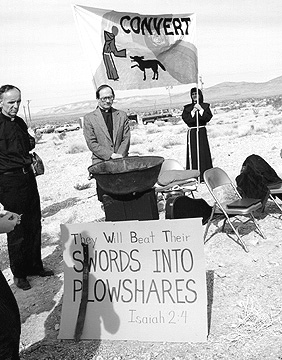

By Rev. Doe West
I have been giving honest contemplation to sponsored hate throughout my life.
A kickover moment came when I posted something on Facebook about the POTUS using the word “animals” to describe immigrants and received a reply pointing out that he was applying that term very specifically to gang members, not all immigrants.
I get it, but that leads me to more questions:
- should we ever allow this level of dehumanizing towards any human being?
- Is it okay to dehumanize those who dehumanize others?
- What does it do for ourselves, our society, humanity, to make hatred and dehumanization acceptable, even mandated?
Culturally acceptable ways to denigrate any group become signposts for directing our hate–sometimes literally, as in “no Irish,” “no Italians,” “no Chinese,” “no Colored.” People have found countless ways to communicate how and when and whom to hate.
Tragically, religious beliefs cannot be trusted to assure mercy, grace, and love, or lead society to higher ground.
On one hand, Father James Martin, SJ, a Jesuit priest, pulls no punches: “Calling people animals is sinful. Every human being has infinite dignity. Moreover, this is the same kind of language that led to the extermination of Jews (”vermin”) in Germany and of Tutsi (“cockroaches”) in Rwanda. This kind of language cannot be normalized. It is a grave sin.”
On the other hand, the most radicalized right religious of any faith consider anyone they hate to personify sin and to be exterminated in the name of their God.
If God is not a safe covering for peace – if language can be easily swung from tool to weapon – if it all comes down to individual belief and personally comfortable boundaries, who is safe? And who or what becomes a place of hope? Is there no clear rallying cry or unifying moral understanding that we can count on to help us all rise to higher ground together?
Personally, I am holding space for hope, and I am working daily to help shape our culture by my words and actions. Today, I will use the words from the Old Testament of the Judeo-Christian text as I did in the ‘60s, when I worked for peace and justice, and as I continue to do today:
“And he shall judge among the nations, and shall rebuke many people: and they shall beat their swords into plowshares, and their spears into pruninghooks: nation shall not lift up sword against nation, neither shall they learn war anymore.” (Isaiah 2:4)
